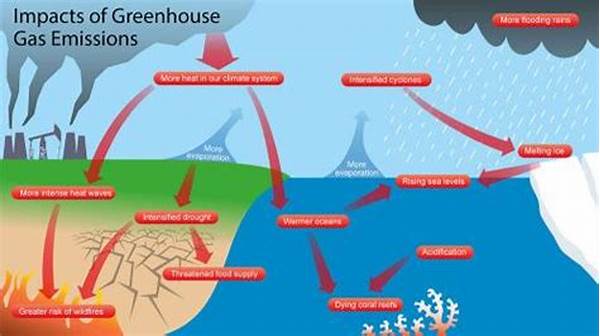Greenhouse gas emissions, primarily composed of carbon dioxide (CO2), methane (CH4), and nitrous oxide (N2O), have significantly altered the atmospheric composition, prompting notable changes in the world’s climate system. These gases trap heat in the Earth’s atmosphere, leading to global warming and various adverse environmental effects. Understanding the impact of greenhouse gas emissions is critical for both policymakers and the general public to formulate strategies aimed at mitigation and adaptation.
Read Now : Product Life Cycle Extension
Environmental Consequences of Greenhouse Gas Emissions
The impact of greenhouse gas emissions on the environment is profound and multifaceted. First and foremost, these emissions contribute to global warming, evidenced by the rising average global temperatures and the increased frequency of extreme weather events such as heatwaves, floods, and hurricanes. Furthermore, the melting of polar ice caps and glaciers, a direct consequence of rising temperatures, leads to rising sea levels. This, in turn, threatens coastal communities and ecosystems worldwide.
Additionally, the impact of greenhouse gas emissions extends to oceanic changes. The warming of ocean waters affects marine biodiversity, with coral bleaching becoming increasingly common. Ocean acidification, another consequence, arises as CO2 dissolves in seawater, disrupting marine life and impacting fisheries that millions rely on for income and food. The far-reaching ecological disruptions illustrate the urgent need for reducing these emissions to mitigate the impact of greenhouse gas emissions on our environment and future generations.
Social and Economic Implications
The impact of greenhouse gas emissions transcends environmental concerns, affecting both social and economic spheres. Economically, the increased frequency of natural disasters as a result of climate change leads to substantial financial losses. The cost of damage to infrastructure, disruptions in agricultural production, and pressures on health systems escalate, demanding significant investment in disaster response and mitigation strategies.
Socially, the impact of greenhouse gas emissions translates into increased health risks. Air pollution resulting from these emissions is linked to respiratory diseases, cardiovascular conditions, and premature deaths. Communities, particularly those in vulnerable regions, face displacement due to climate change-induced phenomena like sea level rise and extreme weather, exacerbating global migration challenges. Thus, addressing the impact of greenhouse gas emissions is imperative for safeguarding human health and ensuring economic stability.
Strategies to Mitigate Greenhouse Gas Emissions
Mitigating the impact of greenhouse gas emissions requires coordinated global efforts and the adoption of sustainable practices. Implementing renewable energy sources, such as wind, solar, and hydroelectric power, reduces reliance on fossil fuels and curtails emissions. Transitioning to energy-efficient technologies in industries and transportation sectors further aids emission reductions.
Carbon pricing mechanisms, including carbon taxes and cap-and-trade systems, provide economic incentives to reduce emissions. The promotion of sustainable agricultural practices and reforestation efforts also plays a crucial role in absorbing CO2 from the atmosphere. A comprehensive approach addressing both emission reduction and adaptation strategies is vital to curbing the impact of greenhouse gas emissions and progressing towards climate resilience.
Read Now : Cross-methodology Research Techniques
Importance of Public Awareness and Education
Raising public awareness about the impact of greenhouse gas emissions is essential for fostering collective action toward mitigation. Effective communication strategies, including educational campaigns and community engagement programs, empower individuals and communities to adopt sustainable practices. Increased public knowledge encourages responsible consumer choices, supports policy initiatives, and drives demand for environmentally friendly products and services. By understanding the significance of reducing their carbon footprint, individuals contribute to the broader effort in combating the impact of greenhouse gas emissions and promoting sustainable development.
Summary of the Impact of Greenhouse Gas Emissions
In summary, the impact of greenhouse gas emissions is a pressing global issue with far-reaching consequences for the environment, society, and economy. These emissions have led to significant environmental changes, including global warming, ocean acidification, and biodiversity loss. Socially, they pose health risks and contribute to displacement challenges, while economically, the cost of climate-related damages continues to rise.
Addressing the impact of greenhouse gas emissions requires urgent and coordinated action. Implementing sustainable energy solutions, enhancing public awareness, and adopting policies aimed at emission reduction are critical steps in mitigating these effects. Ultimately, understanding and addressing the impact of greenhouse gas emissions is crucial for ensuring a sustainable future for coming generations.
